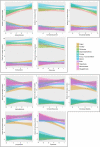Emotional cherry picking: the role of personality and goal orientation in selective emotion regulation for musical practice
- PMID: 37575416
- PMCID: PMC10415679
- DOI: 10.3389/fpsyg.2023.1201442
Emotional cherry picking: the role of personality and goal orientation in selective emotion regulation for musical practice
Abstract
Introduction: Emotion regulation is an important part of optimising performance and successful goal pursuit in practice-based tasks such as making music. Musicians may regulate their own emotions during the course of their musical practice in order to improve their performance and ultimately attain their practice-related goals. The specific emotions they target may depend upon their personality traits but may also relate to the nature of their goal orientation, and the interaction between the two. This study investigates whether the emotions desired by musicians in their musical practice were dependent on their personality traits and Mastery goal orientation (the desire to master musical and technical skills).
Methods: Via an online questionnaire, 421 musicians completed a personality scale and answered questions relating to their mastery practice goals. They also completed emotion scales indicating how strongly they desired to increase or decrease the intensity of specific emotions when practicing.
Results: Overall, musicians preferred to up-regulate positive rather than negative emotions [paired t(420) = 58.13, p < 0.001]. Bayesian Mixed Effects models showed that personality traits affected musicians' desire to regulate specific emotions. For example, higher levels of Agreeableness predicted greater desire to increase positive but not negative emotions, whereas Extraversion predicted greater desire to increase anger [Est. = 0.05, SE = 0.03, Odds (Est. > 0) = 43.03] but not positive emotions. The inclusion of Mastery goal orientation either amplified or mitigated these effects in several cases, and also introduced new trait-emotion relationships. Findings confirm a general hedonic principle underlying the emotions musicians desired in their musical practice. However, predicted by personality traits, musicians also sometimes sought to increase the intensity of unpleasant emotions.
Discussion: These findings complement existing research that suggests that some Mastery-oriented musicians may seek an emotional state consisting of both positive and negative emotions. This and future studies on this topic may contribute to a better understanding of individual differences in emotion regulation ability as a potential aspect of individualised musical practice strategies.
Keywords: emotion regulation; mastery goal; musical practice; personality; trait-dependent.
Copyright © 2023 Breaden Madden, Herff, Beveridge and Jabusch.
Conflict of interest statement
The authors declare that the research was conducted in the absence of any commercial or financial relationships that could be construed as a potential conflict of interest.
Figures

Similar articles
-
Musicians' pursuit of expertise-related goals is characterised by strategic regulation of functional and counterproductive affect.Front Psychol. 2024 Sep 4;15:1407303. doi: 10.3389/fpsyg.2024.1407303. eCollection 2024. Front Psychol. 2024. PMID: 39295770 Free PMC article.
-
Instrumental and Hedonic Motives for Emotion Regulation in Musical Practice.Front Psychol. 2021 Jun 30;12:643974. doi: 10.3389/fpsyg.2021.643974. eCollection 2021. Front Psychol. 2021. PMID: 34276470 Free PMC article.
-
Effects of musical expertise on oscillatory brain activity in response to emotional sounds.Neuropsychologia. 2017 Aug;103:96-105. doi: 10.1016/j.neuropsychologia.2017.07.014. Epub 2017 Jul 15. Neuropsychologia. 2017. PMID: 28720526
-
Cognitive deficits in bipolar disorders: Implications for emotion.Clin Psychol Rev. 2018 Feb;59:126-136. doi: 10.1016/j.cpr.2017.11.006. Epub 2017 Nov 21. Clin Psychol Rev. 2018. PMID: 29195773 Free PMC article. Review.
-
Dancers' and musicians' injuries.Clin Rheumatol. 2013 Apr;32(4):425-34. doi: 10.1007/s10067-013-2184-8. Epub 2013 Apr 10. Clin Rheumatol. 2013. PMID: 23572035 Review.
Cited by
-
Personality Type Shapes Acute Anxiety Response to Music and Medicine Intervention During First Chemotherapy (PEGASUS-2).Appl Psychophysiol Biofeedback. 2025 May 10. doi: 10.1007/s10484-025-09712-2. Online ahead of print. Appl Psychophysiol Biofeedback. 2025. PMID: 40347423
-
Musicians' pursuit of expertise-related goals is characterised by strategic regulation of functional and counterproductive affect.Front Psychol. 2024 Sep 4;15:1407303. doi: 10.3389/fpsyg.2024.1407303. eCollection 2024. Front Psychol. 2024. PMID: 39295770 Free PMC article.
-
Scoping Review on the Use of Music for Emotion Regulation.Behav Sci (Basel). 2024 Sep 9;14(9):793. doi: 10.3390/bs14090793. Behav Sci (Basel). 2024. PMID: 39336008 Free PMC article.
References
-
- Aldao A., Sheppes G., Gross J. J. (2015). Emotion regulation flexibility. Cogn. Ther. Res. 39 263–278. 10.1007/s10608-014-9662-4 - DOI
-
- Araújo M. V., Hein C. F. (2019). A survey to investigate advanced musicians’ flow disposition in individual music practice. Int. J. Music Educ. 37 107–117. 10.1177/0255761418814563 - DOI
-
- Augustine A. A., Hemenover S. H. (2009). On the relative effectiveness of affect regulation strategies: A meta-analysis. Cogn. Emot. 23 1181–1220. 10.1080/02699930802396556 - DOI
LinkOut - more resources
Full Text Sources
Research Materials

